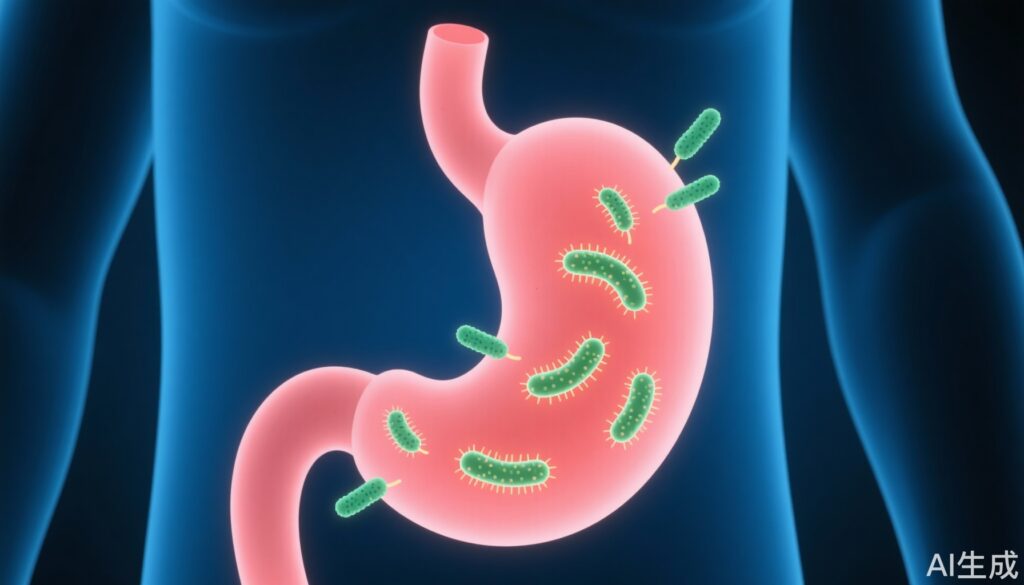Highlight
- Probiotic pretreatment increases the Helicobacter pylori eradication rate by approximately 10% compared to standard eradication therapy alone.
- Probiotics pretreatment significantly reduces eradication therapy-related side effects, potentially improving patient compliance.
- Optimal efficacy is observed with probiotic pretreatment durations of 14 days or longer prior to eradication therapy.
- Consistent benefits across geographic regions, eradication regimens, and probiotic formulations suggest broad applicability.
Study Background and Disease Burden
Helicobacter pylori (H. pylori) infection affects approximately half of the global population and is implicated in chronic gastritis, peptic ulcers, and gastric malignancies including adenocarcinoma and MALT lymphoma. Eradication of H. pylori reduces the incidence of these complications and is a mainstay in clinical management. However, increasing antibiotic resistance and adverse effects reduce eradication success and patient adherence, creating an unmet medical need for adjunctive therapies that improve outcomes.
Probiotics, live microorganisms that confer health benefits to the host, have demonstrated inhibitory effects on H. pylori growth and ability to modulate the gut microbiota. Additionally, probiotics alleviate gastrointestinal symptoms often encountered during standard antibiotic-based eradication therapy. Case reports of H. pylori clearance following fecal microbiota transplantation underscore the potential of gut microbiome modulation as a novel therapeutic approach. Despite these insights, the clinical impact of administering probiotics prior to H. pylori eradication therapy remains unclear.
Study Design
This systematic review and meta-analysis conducted by Zhang et al. synthesized randomized controlled trials (RCTs) to assess the effects of probiotics administered as a pretreatment before H. pylori eradication therapy. The authors performed comprehensive literature searches across PubMed, EMBASE, the Cochrane Library, and the Conference Proceedings Citation Index up to January 31, 2024.
The analysis included 12 RCTs with a total of 2,144 participants who received probiotics prior to standard eradication regimens versus control groups without probiotic pretreatment. Both intention-to-treat (ITT) and per-protocol (PP) analyses were performed to assess H. pylori eradication rates and incidence of treatment-related adverse events. Subgroup analyses examined the influence of geographic location, eradication regimens, probiotic strains and combinations, pretreatment duration, and study design.
Key Findings
The ITT analysis demonstrated a significantly higher overall eradication rate in the probiotics pretreatment group compared to controls (80.34% vs. 70.49%); the pooled risk ratio (RR) was 1.14 (95% confidence interval [CI], 1.08 to 1.19) with moderate heterogeneity (I2 = 36%). This translates to an absolute increase in eradication rate of about 10%, a clinically meaningful improvement.
Similarly, PP analysis showed consistent results with an eradication rate of 86.43% in the probiotics group versus 76.88% in controls (RR = 1.12; 95% CI, 1.08 to 1.17; I2 = 57%). These findings underscore the robustness of the probiotic pretreatment effect.
Importantly, the incidence of eradication therapy side effects was significantly lower with probiotic pretreatment (16.0%) compared to control (28.3%), with RR of 0.59 (95% CI, 0.41 to 0.84). Reduced side effects may enhance therapy tolerability and patient adherence.
Subgroup analyses confirmed consistent benefits across diverse geographic regions and multiple eradication regimens including triple and quadruple therapies. Various probiotic strains and combinations demonstrated efficacy, supporting the generalizability of these findings.
Pretreatment duration emerged as a critical factor: probiotic use for 14 days or more prior to eradication therapy led to significant improvements in eradication rates, whereas shorter durations did not yield statistically significant results. Furthermore, study designs comparing probiotic pretreatment alone or in combination with eradication therapy against no probiotics demonstrated significant benefit.
Overall, these data indicate that probiotic pretreatment enhances H. pylori eradication efficacy and reduces adverse events, offering a safe and effective strategy to optimize current treatment protocols.
Expert Commentary
This meta-analysis provides important clinical insights into the adjunctive role of probiotics in H. pylori eradication. By priming the gut microbiome, probiotics appear to inhibit H. pylori colonization and mitigate intestinal dysbiosis induced by antibiotics. The findings align with mechanistic studies showing probiotic-mediated competitive inhibition, enhancement of mucosal immunity, and anti-inflammatory effects.
From a clinical perspective, the reduction in side effects such as diarrhea, nausea, and abdominal discomfort could markedly improve patient compliance, which remains a major barrier in eradication therapy. The pooled absolute increase in eradication rate of approximately 10% is highly relevant given the rising antibiotic resistance challenges.
Limitations include moderate heterogeneity among studies, variability in probiotic strains and formulations, and a predominance of short- to medium-term follow-up. Future research should address optimal probiotic strains, dosage, and duration as well as mechanistic pathways and microbiome profiling.
Currently, international guidelines have begun to recognize the potential of probiotics as adjunctive therapy but do not explicitly recommend pretreatment protocols. These emerging data provide a strong rationale for guideline updates and wider clinical adoption.
Conclusion
The use of probiotics as pretreatment prior to Helicobacter pylori eradication therapy significantly improves eradication success rates and reduces therapy-related side effects. This approach represents a promising advancement in the management of H. pylori infection, especially amidst increasing antibiotic resistance and treatment failures. Probiotics modulate the gut microbiome, enhance mucosal defense, and improve tolerability of eradication regimens.
Given these findings, clinicians should consider incorporating probiotic pretreatment strategies, particularly with regimens of at least 14 days duration, to optimize patient outcomes. Further large-scale RCTs and mechanistic studies are warranted to fine-tune probiotic selection and treatment schedules and to elucidate the underlying biological interactions.
References
1. Zhang Y, Tu M, Long P, Zheng J, Du G, Xiao S, Gao C. Efficacy of probiotics pretreatment in Helicobacter pylori eradication therapy: a systematic review and meta-analysis of clinical outcomes. Ann Med. 2025 Dec;57(1):2533431. doi: 10.1080/07853890.2025.2533431. Epub 2025 Jul 23. PMID: 40697099; PMCID: PMC12288164.
2. Malfertheiner P, Megraud F, O’Morain CA, et al. Management of Helicobacter pylori infection—the Maastricht V/Florence Consensus Report. Gut. 2017 Jan;66(1):6-30. doi:10.1136/gutjnl-2016-312288.
3. Sanders ME, Benson A, Lebeer S, et al. Shared mechanisms among probiotic taxa: implications for general probiotic claims. Curr Opin Biotechnol. 2021 Feb;68:126-135. doi:10.1016/j.copbio.2020.08.022.
4. Hu Y, He Y, Zhang L, et al. Probiotics used as adjunctive treatment of Helicobacter pylori infection: a systematic review and meta-analysis. Helicobacter. 2017 Jun;22(3). doi:10.1111/hel.12343.
5. Szajewska H, Horvath A, Piwowarczyk A. Meta-analysis: the effects of Lactobacillus and Bifidobacterium supplementation on Helicobacter pylori eradication rates and side effects of eradication therapy. Aliment Pharmacol Ther. 2010 Feb;31(1):106-17. doi:10.1111/j.1365-2036.2009.04143.x.


